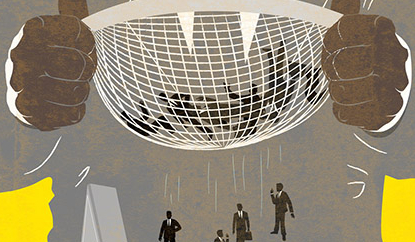英文法律词典 A-74
|
AFFIRMATIVE PREGNANT, Pleading. An affirmative allegation, implying some negative, in favor of the adverse party, for example, if to an action of assumpsit, which is barred by the act of limitations of six years, the defendant pleads that be did not undertake &c. within ten years; a replication that he did undertake, &c. within ten years, would be an affirmative pregnant; since it would impliedly admit that the defendant had not promised within six years. As no proper issue could be tendered upon such plea the plaintiff should, for that reason, demur to it. Gould, PI. c. 6 29, 37; Steph. PI. 381; Lawes, Civ. PI. 113; Bac. Ab. Pleas, N 6. AFFORCE, AFFORCEMENT OF THE ASSIZE, Old English law, practice. An ancient practice in trials by jury, which is explained by Bracton, (fo. 185, b. 292 a) and by the author of Fleta, lib. 4, cap. 9, 2. It consisted in adding other jurors to the panel of jurors, after the cause had been committed to them, in case they could not agree in a verdict. The author of Fleta (ubi sup) thus describes it. The oath having been administered to the jury, the (prenotarius) prothonotary, addressed them thus: "You will say upon the oath you have taken, whether such a one unjustly and without judgment disseized such a one of his freehold in such a ville within three years or not." The justices also repeat for the instruction of, the jurors the plaint of the plaintiff, &c. The jurors then retire and confer together, &c.;If the jurors differ among themselves and cannot agree in one (sententiam) finding, it will be in the discretion of the judges, &c; to afforce the assize by others, provided there remain of the jurors summoned many as the major party of the dissenting jurors; or they may compel the same jurors to unanimity, viz. by directing the sheriff to keep them safely without, meat or drink until they agree. The object of adding to the panel a number equal to the major party of the dissenting jurors, was to ensure a verdict by twelve of them, if the jurors thus added to the panel should concur with the minor party of the dissenting jurors. This practice of afforcing the assize, was in reality a second trial of the cause, and was abandoned, because the courts found it would save delay and trouble by insisting upon unanimity. The practice of confining jurors without meat and drink in order to enforce unanimity, has in more modern times also been abandoned and the more rational practice adopted of discharging the jury and summoning a new one for the trial of the cause, in cases where they cannot agree. This expedient for enforcing unanimity was probably introduced from the canon law, as we find it was resorted to on the continent, in other cases where the unanimity of a consultative or deliberative body was deemed indispensable. See Barring. on Stats. 19, 20; 1, Fournel, Hist. des Avocats, 28, note. TO AFFRANCHISE. To make free. AFFRAY, criminal law. The fighting of two or more persons, in some public place, to the terror of the people. 2. To constitute this offence there must be, 1st, a fighting; 2d, the fighting must be between two or more persons; 3d, it must be in some public place ; 4th, it must be to the terror of the people. 3. It differs from a riot, it not being premeditated; for if any persons meet together upon any lawful or innocent occasion, and happen on a sudden to engage in fighting, they are not guilty of a riot but an affray only; and in that case none are guilty except those actually engaged in it. Hawk. b. 1, c. 65, s. 3 ; 4 Bl. Com. 146; 1 Russell, 271. AFFREIGHTMEET, Com. law. The contract by which a vessel or the use of it, is let out to hire. See Freight; General ship. AFORESAID. Before mentioned; already spoken of. This is used for the purpose of identifying a person or thing; as where Peter, of the city of Philadelphia, has been mentioned; when it is necessary to speak of him, it is only requisite to say Peter aforesaid, and if the city of Philadelphia, it may be done as the city of Philadelphia, aforesaid. |








